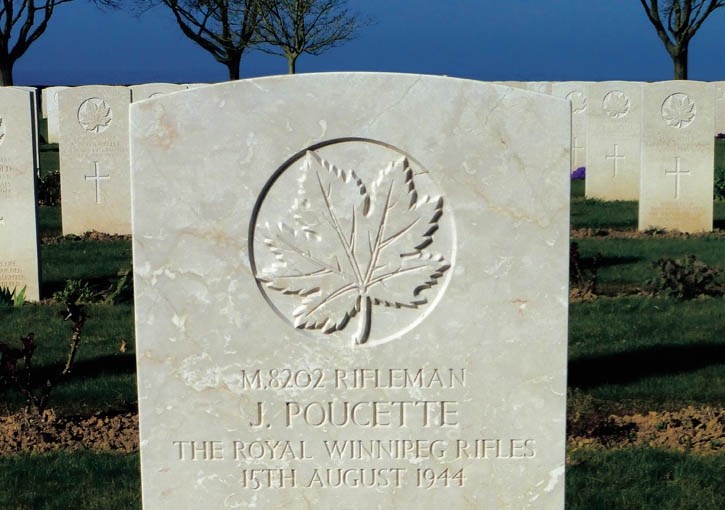As snow flurries begin to blanket the Rockies and foothills with fresh white powder, you can’t help but wonder how Rifleman Joe Poucette would have reacted if he was able to see one last Canadian snowfall.
Poucette, of the Royal Winnipeg Rifles, was killed in action on Aug. 15, 1944 in France while serving in the Second World War at the age of 21. He was the only Stoney man to fight overseas against the Axis that held a vice grip on the world.
Inside Poucette’s official records with the Canadian Army he was listed as just shy of five-foot-four-inches in height, and weighed 125 pounds, but the young man from Morley’s physical prowess isn’t what makes history; it’s what he represented that defines what it means to be “Stoney warrior.”
Poucette often wrote letters back home to the reserve for family and friends while serving overseas. One letter written to Eugene Leppard, a teacher in Morley, survived time through mention in an article published and sullenly titled, “Rflmn. Joe Poucette won’t see snow again.”
In true Western Canadian fashion, Poucette wrote to Leppard that he was saddened to miss the Calgary Stampede that summer, but knew his duty outweighed the activities and fun this time around.
Poucette forecasted about his eventual return to Morley and dreamed that, “Perhaps it might be snowing when I get home.” Poucette never made it home to see the snow again. His remains are in the Bretteville-Sur-Laize Canadian War Cemetery in Calvados, France.
“It’s a sadness that his body could not be brought back here for burials,” said Tina Fox, Poucette’s niece.
This Remembrance Day (Nov. 11), Fox will honour her uncle and lay a wreath in Cochrane at the cenotaph near the Legion Hall during services.
With a famous relative, Fox grew up listening to stories about her uncle from her father, Poucette’s older brother, about how he represented what a Stoney warrior ought to be.
“Brave and courageous; fearless. Men at that time were raised to be fearless,” Fox said.
Although she cannot remember her uncle because she was only three when he was killed, Fox feels like she grew up knowing him.
For decades, an article his letter was partially based on was tucked away. Author Anne Gafiuk has chronicled the article as part of her new book She Made Them Family: A Wartime Scrapbook from the Prairies. Gafiuk’s book launch is this Sunday (Nov. 8) at the Rotary Performing Arts Centre in Okotoks.
Gafiuk brings to life a Second World War scrapbook of letters, articles and notes from Okotoks men and women who served and were saved by an Okotoks woman named Alice Spackman. Poucette is the only First Nations man mentioned in Spackman’s timeworn scrapbook.
Gafiuk says it’s believed Poucette and other Stoneys used to do farm work in town and that’s where the connection began. Gafiuk believes the initial article that sparked her research into Poucette’s service was published in the Calgary Herald or The Albertan in the 1940s.
Through her research, Gafiuk’s impression of Poucette was that the young man wanted to show the world what First Nations people were about.
“He wanted to prove something ... to make a difference and change people’s lives,” said Gafiuk. “He wanted to show the rest of the world what the Stoney people were about by enlisting.”
Poucette was a fresh-faced 19 year old when he enrolled in the Canadian Army in 1943. He didn’t mention he joined the army to his family until after the fact.
Peter Jonker, author of The Song and the Silence: Sitting Wind, an autobiography about Stoney Chief Frank Kaquitts, wrote that Kaquitts was among the group of Stoney family and friends that saw Poucette off the day he boarded the train at the Calgary Train Station to begin his journey to Europe.
Poucette was proud and enthusiastic that day, Kaquitts recalled of his cousin. Kaquitts enlisted the same day as Poucette, but a foot injury prevented him from heading overseas. The excited face of his cousin boarding the train would be his last memory for Kaquitts. Poucette’s remains lay at rest among his comrades in France.
In 1977, Fox was on hand to see British royalty pay tribute to Poucette. Prince Charles visited a memorial dedicated to Poucette in Morley as part of the 100-year commemoration of the signing of Treaty Seven.
For further information on She Made Them Family: A Wartime Scrapbook from the Prairies, please refer to Anne Gafiuk’s website, whatsinastory.ca.




